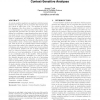Free Online Productivity Tools
i2Speak
i2Symbol
i2OCR
iTex2Img
iWeb2Print
iWeb2Shot
i2Type
iPdf2Split
iPdf2Merge
i2Bopomofo
i2Arabic
i2Style
i2Image
i2PDF
iLatex2Rtf
Sci2ools
112
Voted
PASTE
2004
ACM
2004
ACM
Resolving and applying constraint queries on context-sensitive analyses
A context-sensitive analysis is an analysis in which program elements are assigned sets of properties that depend upon the context in which they occur. For analyses on imperative languages, this often refers to considering the behavior of statements in a called procedure with respect to the call-stack that generated the procedure invocation. Algorithms for performing or approximating these types of analyses make up the core of interprocedural program analysis and are pervasive, having applications in program comprehension, optimization, and verification. However, for many of these applications what is of interest is the solution to the dual problem: given a vertex and a desirable set of properties, what is the set of potential stack-contexts leading to that vertex that results in the desirable property set? Many techniques, such as procedure cloning, have been developed to approximately partition the set of stack-contexts leading to a vertex according to such a condition. This paper ...
| Added | 30 Jun 2010 |
| Updated | 30 Jun 2010 |
| Type | Conference |
| Year | 2004 |
| Where | PASTE |
| Authors | James Ezick |
Comments (0)

